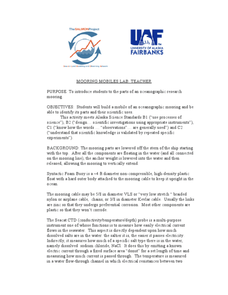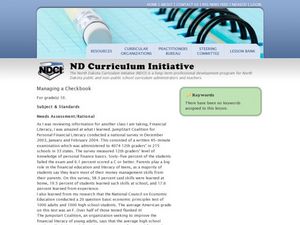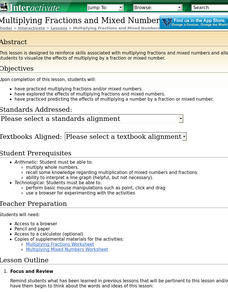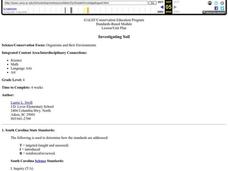Curated OER
Interpreting and Displaying Sets of Data
Students explore the concept of interpreting data. In this interpreting data lesson, students make a line plot of themselves according to the number of cubes they can hold in their hand. Students create their own data to graph and...
Curated OER
Mooring Mobiles Lab
Oceanography experts use candy to construct a model of a bio-physical mooring that would test a variety of factors. Each piece of equipment to be included on the mooring is described within the write-up. As pupils gather the candies for...
Curated OER
The Japanese Garden
Pupils use the internet to gather information on the Japanese Gardens. They discuss topics with a horticulturist and build a replica of the gardens at their school. They work together to identify different types of plants.
Curated OER
Market Basics: Demand, Supply, and Price Determination
Students are introduced to the concepts of supply and demand. Using the Law of Demand and Supply, they develop charts and graphic models of supply and demand. They compare and contrast the behavior of consumers and suppliers when there...
Curated OER
BEETLES: The Coming Out
Students design an experiment to test the variables involved in the hatching of the Bruchid beetle.
Curated OER
Managing a Checkbook
How do grown ups do it? Teach your upper graders the ins and outs of personal finance by having them use their algebra skills to balance a checkbook. They examine the financial side of math, set up a checking account, and balance their...
Curated OER
Topos, Compasses, and Triangles, Oh My!
Students triangulate using a compass, topographical (topo) map and a view of outside landmarks. They take a field trip to another location away from school and mark discernible landmarks (like mountains or radio towers) and changes in...
Curated OER
Multiplying Decimals and Mixed Numbers
Students practice multiplying decimals and/or mixed numbers, explore the effects of multiplying decimals and mixed numbers, and practice predicting the effects of multiplying a number by a decimal or mixed number.
Pennsylvania Department of Education
Volume of Compound Figures
Fifth graders use patterns, models and relationships to solve equations. In this equations lesson plan, 5th graders define vocabulary for equations and complete worksheets explaining variables and solving problems.
Curated OER
Finding the Area Under A Curve with Random Probability
Students explore the concept of area under a curve. For this area under a curve lesson, students find the area under a curve using the Monte Carlo method using random points and probability. Students calculate the area under the same...
Curated OER
Sliders - Static and Kinetic Friction
Students work in groups to conduct experiments the demonstrate the differences between static and kinetic friction. They consider how friction affects us in our everyday lives, determine the effects of weight on friction and complete a...
Pennsylvania Department of Education
Volume of Regular and Irregular Objects
Fifth graders examine patterns and relate to equations to solve math problems. In this patterns activity, 5th graders diagram, graph, use models and use tables to solve equations for real world problems.
Curated OER
Salt Marsh in a Pan
Students create a model of a salt marsh to discover the impact of pollution and human activities on water-based habitats including bays and the ocean. They recognize the relationship between natural and developed areas. Students impact...
Curated OER
Linear and Exponential Models
Students linearize data to determine if an exponential model is suitable. In this linearizing data to determine if an exponential model is suitable instructional activity, students graph the residuals of sets of data that appear to have...
Curated OER
Newton's Laws
Students identify Sir Isaac Newton and his contribution to physics. They write Newton's three Laws of classical mechanics. and apply Newton's Laws to the world around them. They isolate a situation and apply Newton's Laws.
Curated OER
Botanical Discoveries
Sixth graders examine the Lewis and Clark Expedition. In this plant discovery activity, 6th graders put in chronological order the plant discoveries of Lewis and Clark. Students understand the characteristics of leaves and find the area...
Curated OER
Foods and Languages of the World
Students explore cultures around the world. In this cross-curriculum geography lesson, students listen to This is the Way We Go to School , a Book about Children around the World , and locate various countries on the globe and a map....
Curated OER
How much room?
Students examine the amount of usable space that exists in their classroom using square meters and square centimeters. They apply the information to predict the ideal size of a classroom.
Curated OER
Scavenger Hunt
Second graders participate in a Scavenger Hunt to find out how long 1 cm is. They then find 10 objects that estimate to be 1 cm in length and record their findings on the table provided and check their estimates using a ruler.
Curated OER
From Bats to Babies: Ultrasound
High schoolers research and analyze sound waves and how an ultrasound works to image a baby in utero. They explore various websites, complete worksheets, and write a paragraph describing a demonstration they view in the classroom.
Curated OER
Anything I Can Do You Can Do Better
Students complete a two-week unit involving design and construction concepts. They watch a PowerPoint presentation about geometric shapes, draw the fourteen shapes incorporated in bridge construction, and in small groups design, build,...
Curated OER
Pent-up Pentominoes
Students explore pentominoes in this activity. They build shapes as directed and color the tiles on their grid sheet.
Curated OER
How many isosceles triangles can you find?
Seventh graders recognize the characteristics of isosceles triangles. In this isosceles triangle lesson, 7th graders use geoboards to create isosceles triangles. Students record results and explain why they have an isosceles triangle.
Curated OER
Investigating Soil
Fourth graders swap local soil samples with another school and examine the differences. They research soil properties, identify organisms that live in soil, create and maintain a biome of soil decomposition and design a poster to present...























